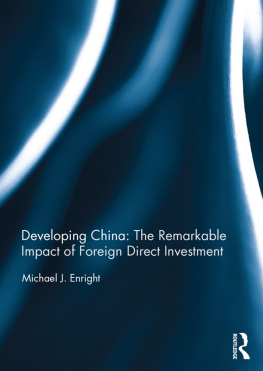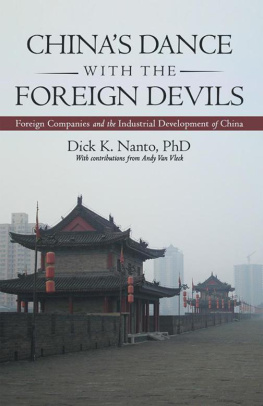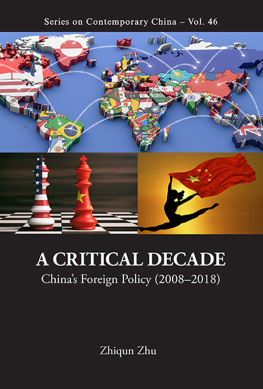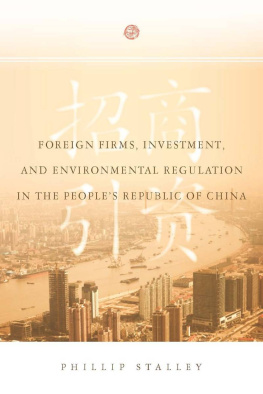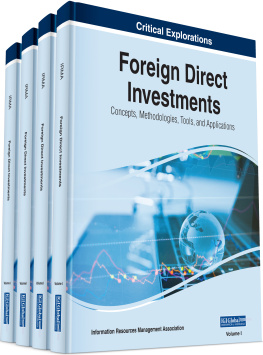Developing China: The Remarkable Impact of Foreign Direct Investment
One of the most important features of Chinas economic emergence has been the role of foreign investment and foreign companies. The importance goes well beyond the USD 1.6 trillion in foreign direct investment that China has received since it started opening its economy. Using the tools of economic impact analysis, the author estimates that around one-third of Chinas GDP in recent years has been generated by the investments, operations, and supply chains of foreign invested companies. In addition, foreign companies have developed industries, created suppliers and distributors, introduced modern technologies, improved business practices, modernized management training, improved sustainability performance, and helped shape Chinas legal and regulatory systems. These impacts have helped China become the worlds second largest economy, its leading exporter, and one of its leading destinations for inward investment.
The book provides a powerful analysis of Chinas policies toward foreign investment that can inform policy makers around the world, while giving foreign companies tools to demonstrate their contributions to host countries and showing the tremendous power of foreign investment to help transform economies.
This book was commissioned by the Hinrich Foundation for sustainable global trade.
Michael J. Enright, a leading expert on competitiveness, regional economic development, and international business strategy, became the Sun Hung Kai Professor of Business at the University of Hong Kong in 1996 after six years as a professor at the Harvard Business School. He is also a director of Enright, Scott & Associates consultancy and a founder of The Competitiveness Institute. Professor Enright has consulted for companies, governments, and multilateral organizations in more than 30 countries on six continents on international business strategy, competitiveness, regional clustering, technology policy, and economic development; has appeared in 40 countries as a featured speaker; and has authored numerous books and monographs on international competitiveness and Chinas development.
Developing China: The Remarkable Impact of Foreign Direct Investment
Michael J. Enright

First published 2017
by Routledge
2 Park Square, Milton Park, Abingdon, Oxon OX14 4RN
and by Routledge
711 Third Avenue, New York, NY 10017
Routledge is an imprint of the Taylor & Francis Group, an informa business
2017 The Hinrich Foundation
The right of Michael J. Enright to be identified as author of this work has been asserted by him in accordance with sections 77 and 78 of the Copyright, Designs and Patents Act 1988.
All rights reserved. No part of this book may be reprinted or reproduced or utilised in any form or by any electronic, mechanical, or other means, now known or hereafter invented, including photocopying and recording, or in any information storage or retrieval system, without permission in writing from the publishers.
Trademark notice: Product or corporate names may be trademarks or registered trademarks, and are used only for identification and explanation without intent to infringe.
British Library Cataloguing in Publication Data
A catalogue record for this book is available from the British Library
Library of Congress Cataloging-in-Publication Data
Names: Enright, Michael J., author.
Title: Developing China : the remarkable impact of foreign direct investment / by Michael J. Enright.
Description: First Edition. | New York : Routledge, 2017. | Includes bibliographical references and index.
Identifiers: LCCN 2016028224 | ISBN 9781138228153 (hardback) | ISBN 9781138228160 (pbk.) | ISBN 9781315393346 (ebook)
Subjects: LCSH: Investments, ForeignChina. | Economic developmentChina. | ChinaForeign relations. | ChinaEconomic policy.
Classification: LCC HG4538 .E57 2017 | DDC 338.951dc23
LC record available at https://lccn.loc.gov/2016028224
ISBN: 978-1-138-22815-3 (hbk)
ISBN: 978-1-138-22816-0 (pbk)
ISBN: 978-1-315-39334-6 (ebk)
Typeset in Goudy
by Apex CoVantage, LLC
Contents
Chinas economic rise has been historically unique in a number of respects, not the least of which has been the speed and steepness of its ascent. What is less well recognized however is the profound role played by foreign direct investment, and the deliberate and carefully calibrated manner in which Chinese officials gradually permitted, and selectively encouraged, these investments.
Japan, the first East Asian economic miracle, blazed the trail for all of its neighbours, rebuilding its devastated post-war economy through an export-led development model and highly targeted industrial policies. The four Asian tigers Singapore, Hong Kong, South Korea, and Taiwan borrowed heavily from the Japanese approach, and likewise began their rapid economic ascent in the 1960s and 1970s.
But it was China perhaps more so than any other country that recognized the unique potential of FDI to catapult the country up the economic development ladder, through the absorption of capital, technology, distribution channels, and managerial know-how.
When China first embarked on its reform and opening-up process in the late 1970s, its economy was poor, isolated, and backward and foreign direct investment was virtually zero. Little more than three decades later, China has become the second largest economy in the world, the leading exporter, and the largest recipient of foreign direct investment. Chinese companies have become highly competitive, transforming the country into the factory of the world, an implacable export powerhouse, and more recently an increasingly formidable presence in a variety of high technology sectors.
Adjectives such as remarkable, miraculous, and unprecedented have routinely been used to describe Chinas trajectory, but they are hardly adequate to convey the true magnitude of the amount of ground China has covered in a handful of decades. China essentially remade its national economy overnight, at least in developmental terms.
The rest of the world was, for the most part, thoroughly unprepared for Chinas transformation. Chinas accession to the World Trade Organization in 2001 was a watershed, helping to accelerate the Chinese export juggernaut by providing secure access to the large consumer markets of the developed world. But previous economic models simply didnt account for or anticipate the impact of a country the size of China entering the world economy, nor the extraordinary leverage that foreign direct investment could provide in the process.
The impact of Chinas arrival on the global economic stage has been complex and multifaceted. While developed world consumers benefited from lower cost manufactured products from China, the labour force disruptions in import-sensitive industries have proven to be deeper and longer lasting than the economic textbooks would have predicted. From a corporate opportunity perspective, China has evolved from being a low-cost export platform to a substantial consumer market in its own right a growth story in which almost every major multinational corporation feels they need to participate. By the second decade of the 21st century, Chinas integration into the global economy, and the influence it exerts, could hardly be more complete.

